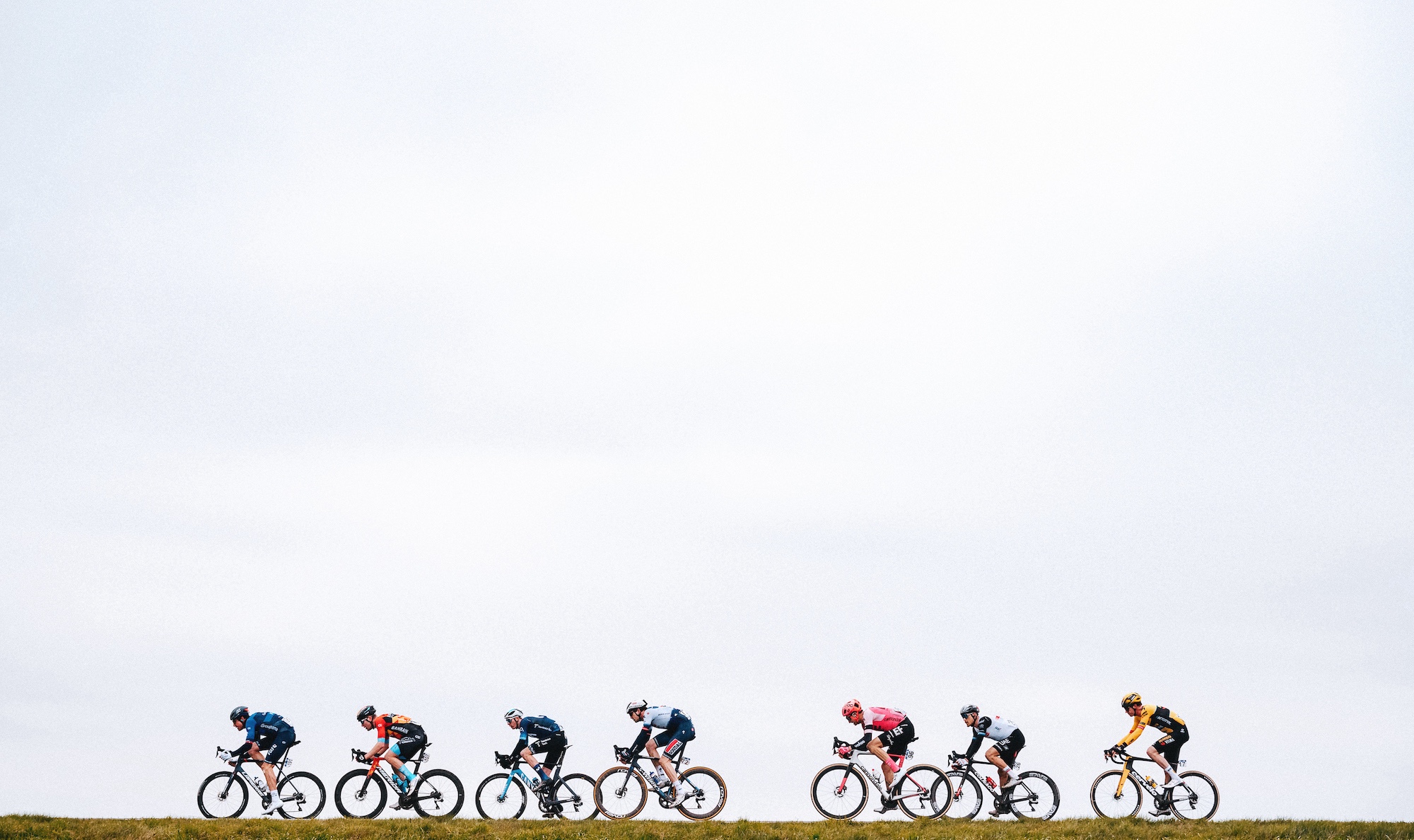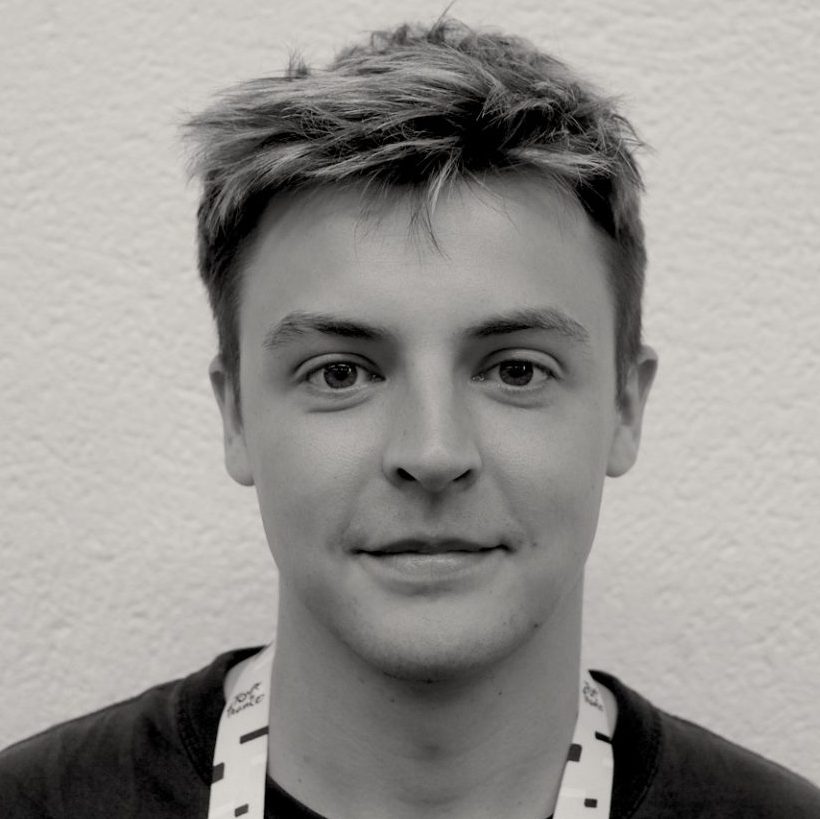It’s early on Sunday morning and there’s a car park just outside the centre of Bruges that’s abuzz with activity.
As the riders and teams for the Tour of Flanders pull in, fans have already congregated. It’s as if they are looking for clues as to how the coming race may likely unfold, which they could learn by observing how the various buses have been parked.
Soudal Quick-Step have sidled up right next to Jumbo-Visma, Alpecin-Deceuninck are tucked away obscurely further down the row within a bunch of the middling squads. Cofidis and Sport Vlaanderen Baloise are separated in their own section entirely, while UAE Tour Emirates are stationed slap-bang in the middle of the entire concrete courtyard.
The riders soon disembark from the warmth of their buses for a procession into the historic centre-ville of the city. Cheers go up when the crowds recognise the more notable riders, who then arrive to throngs of people in the town centre and make their way up to the stage to be officially presented.
Biniam Girmay is sung happy birthday, on what would prove to be a sad, crash-ridden affair for him. It’s the one a cappella effort amongst the incessant barrage of dance music, blasted at such a volume that anyone who was asleep is now most definitely awake. Soon the riders shiver as they make their way through the mixed zone and this is where we learn that bus parking layout says little of how today will shake out.
Instead, anyone who is not Tadej Pogačar, Mathieu van der Poel, or Wout van Aert plans to trébuchet themselves off the front of the race and then later on stick an arm out to try and flag down the triumvirate bike racing bus that will be steamrollering past at some point.
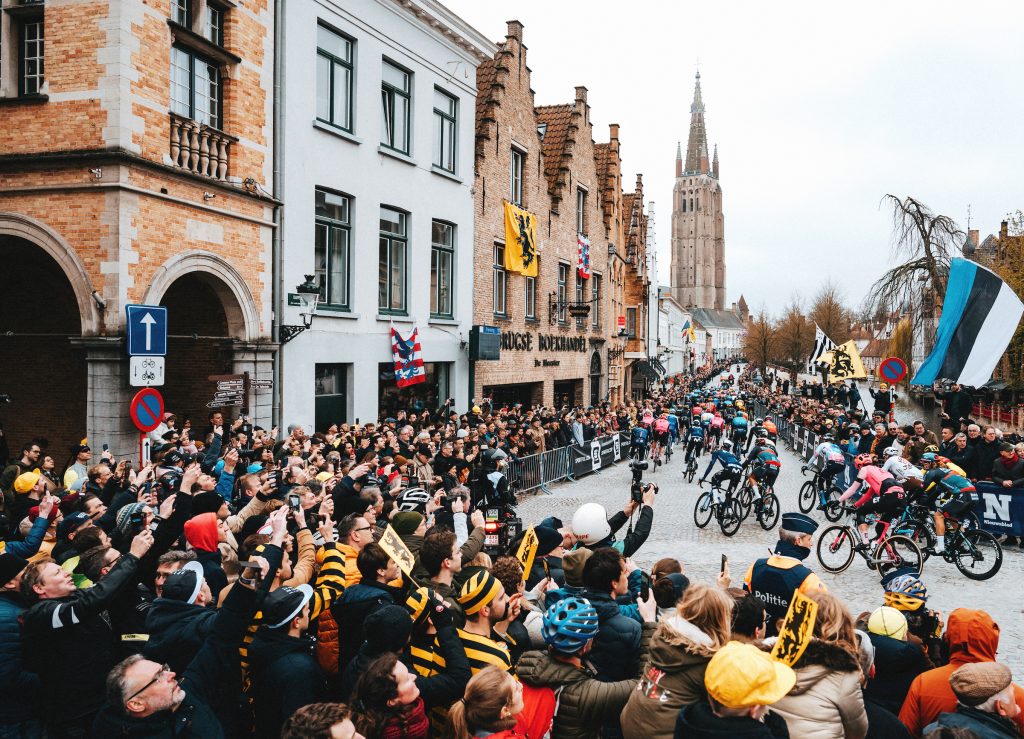
“Is it too early at 8.30 in the morning to be so amped?” Matteo Jorgenson is asked.
“I’m trying to stay calm but everyone else seems pretty amped at 8.30am yeah,” he chuckles in response. Everybody can sense that something special is going to happen today.
“I’m feeling okay but it’s more the other riders I’m worried about,” Oliver Naesen says slightly anxiously, giving a nod to The Big Three. Last year, he explained to me how the Tour of Flanders is a coffee filter where only the highest quality gets through and the rest are left behind.
“Will we only have three drops of coffee to drink, then?” I ask.
“Most likely yeah,” he replies, half smiling, half exasperated. “I’m afraid so.”
“Maybe we need to find a different way to make coffee then?”
“Yeah…I don’t know what though.”
L’Équipe gave its five-star rating to these three towering favourites, and such is their prowess that no other riders were deemed close enough to be given four or even three-star ratings of their chances.
Such is the gulf that the obvious plan for everyone else with even a glimmer of hope of somehow overcoming The Three is to position themselves up the road in the hope that they can leap onto this six-wheeled train as it motors past at an undefined later point in the race.
However, the optimism was still high.
“I think today will be a good day,” said Fred Wright, confident in his own ability. “We’re both willing to risk it for the biscuit,” added Neilson Powless of his and fellow American Jorgenson’s chances, while using a phrase much more common in Wright’s homeland. It originates from when critters in search of a free meal were trapped using biscuits and other foods, and turned out to be rather prescient for how the 270 kilometres of racing would eventually turn out.
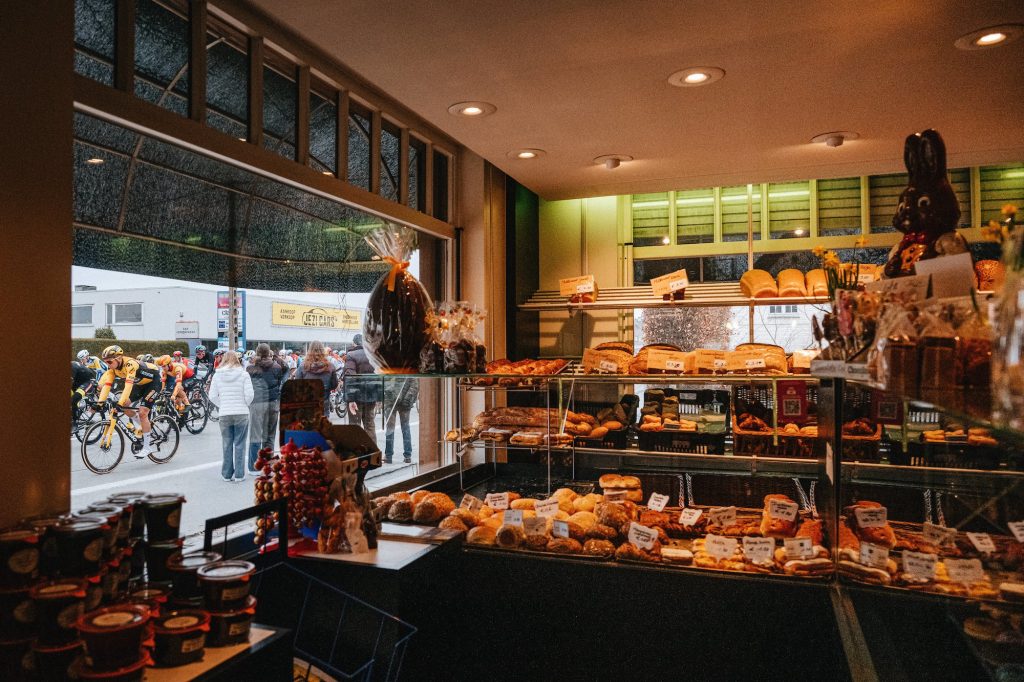
Back to the start and back to the paddock. At the buses the riders are returning from sign-on. Edoardo Affini scampers back under the rope separating the Jumbo-Visma bus from the public. “He looks stressed,” a middle-aged Belgian woman says to her friend. One man who does not look burdened is the recently retired Tom Dumoulin, who can be spotted having a coffee amongst the staff at Q36.5.
The biggest crowd in attendance is at the Jumbo-Visma bus, the crush at Alpecin-Deceuninck for Mathieu van der Poel only slightly smaller. When Van Aert returns, and you can audibly chart his progress as the cheers from the fans rise and fall; even Groupama-FDJ’s Father Time Marc Madiot walks over to take a peek. Half an hour later, he is less pensive, trying to drive the wrong way out of the paddock onto the start line, briefly remonstrating with the steward who stands his ground. Amongst the bystanders is a small Belgian child dressed up in a costume resembling a cone of frites.
As the frites child wandered off (hopefully toward adult supervision and a new wardrobe) the race got underway. After a frantic, crash-marred start, the group of anticipators eventually forced themselves clear. “There was maybe five minutes of chill time,” said Jorgenson at the finish of the chaotic early going. “I was caught in this big crash with [Peter] Sagan, huge crash, outside of Oudenaarde, had to wait, change the bike, because my bike was broken, and thankfully I had Ivan Romeo and he brought me back, just him.” They made contact just in time for the first passage of the Oude Kwaremont. Not long after, on the Molenberg, fully 100 km from the finish, the big move went clear.
It was a who’s who of everyone who wasn’t one of The Big Three: guys like Pedersen, Kasper Asgreen, Matteo Trentin, Stefan Küng and, of course, the two Americans, among others. Yes, Tadej Pogačar eventually proved inevitable, yet this group of anticipators arguably made the race. At one point, a decent gap combined with a strong group looked like it could go the distance, and even when that possibility faded, the group provided the perfect mix of abilities and allegiances for Pogačar, Van der Poel and Van Aert to conduct their own fascinating battle.
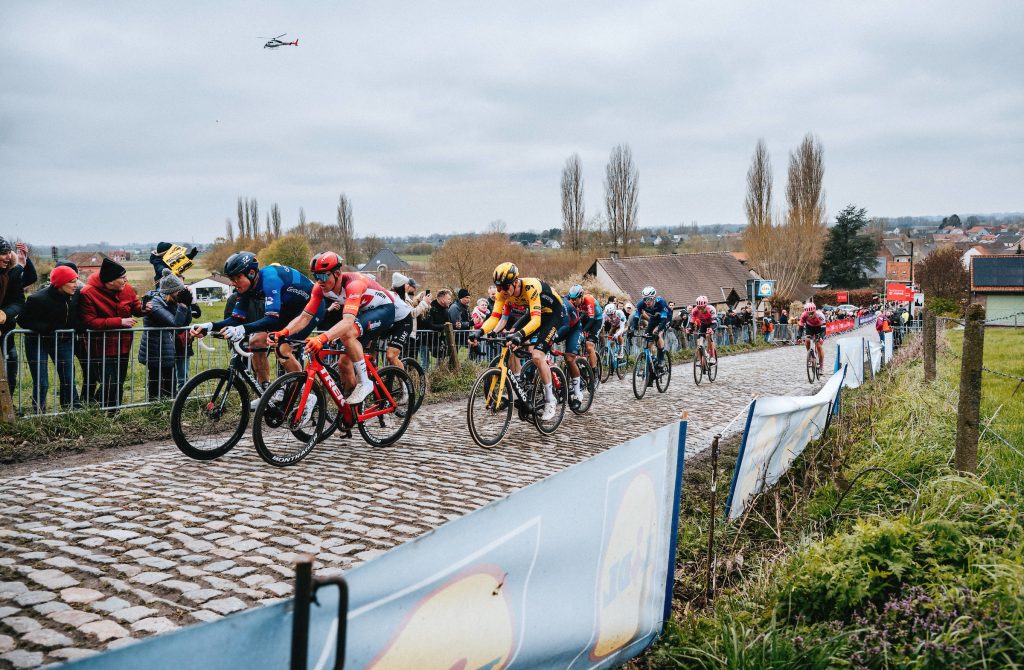
“No,” said Pedersen when asked if he was surprised such a large group of outside favourites had made it up the road in such a speculative move. “I think every strong rider underneath those three wanted to anticipate and be out there early. I think most of us had the same game plan and it was about finding the right moment and each other at the same time.”
At the end of the race, having been left to fight for the scraps, Pedersen taking a well-earned third podium spot, there were smiles all round. This is a big race, won by a big rider. That they formed a considerable part of the ensemble was a point of pride, a display of their own powers.
“One little mistake there and then you’re not there in the final…” Wright began, already playing back the small moments that matter in a bike race of such fine margins. “But I’m definitely there more than I was last year so you know I got further into the race feeling better. I’ll get the podium or the win at some point…I was close man, I just ran out…that sprint man I just had nothing.”
“Like I said this morning I just had to take some risks if I wanted to try and win today,” Powless reminded us. He fought through two crashes and a lost computer that left him racing mostly on instinct. “I’m just proud,” he said. “I never thought I’d be fighting for top five in the Tour of Flanders.”
Was there much discussion within the group of what to do when they knew The Big Three had launched, that they would be entering their orbit sooner rather than later?
“Not really to be honest, it’s just eyeballs out,” Wright explained. “I shouldn’t have let Mads [Pedersen, who attacked solo late on] go but then he did come back. He sort of rolled off in front of me on the descent and I was like…it’s a weird one when you get to the final of the race, I was just happy to not blow, that would have been embarrassing.”
“That was basically how I wanted to race and to not be afraid of running out of bullets,” Pedersen added. “I’d rather try and die in the end than just try to follow and still pop. so it turned out quite okay.”
Prior to speaking to us in English, Pedersen conversed with a Danish journalist, and the unmistakable sound of the word “fucking” was used in one answer. Pedersen was coy in what exactly was conveyed but we later found out he had said he knew after last year that Pogačar would go up the Kwaremont fast and it turned out he did go up it fast. Really fucking fast, in fact.
What did you think when Pogačar went past you?
“Good luck my friend, see you later.”
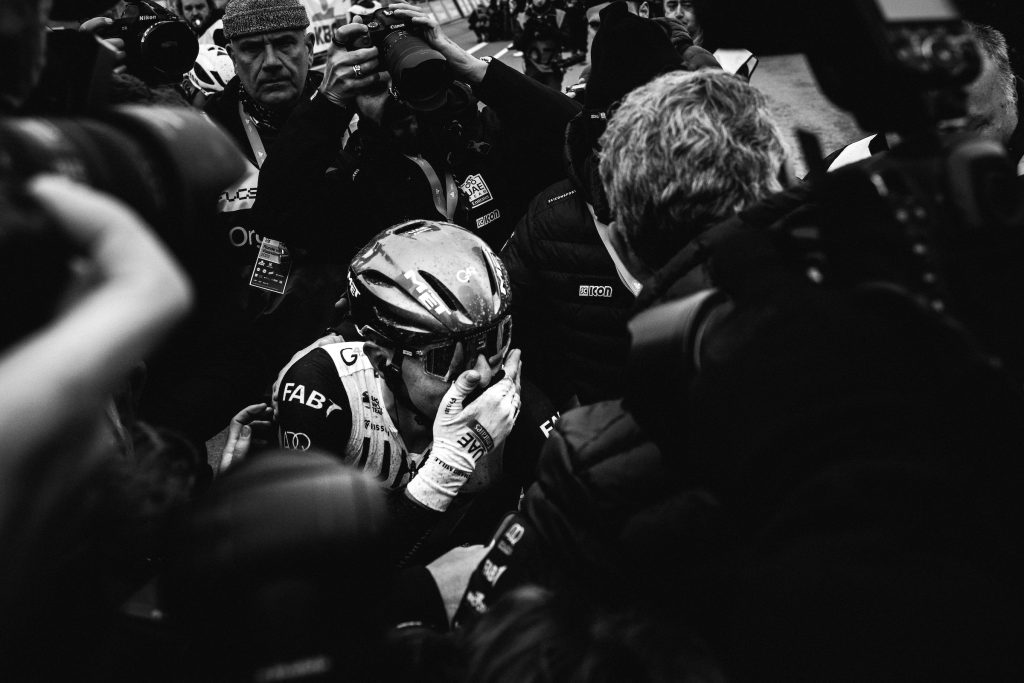
Pogačar set out and achieved what he wanted and was expected to do, and instead of having a rider of his dominance create a scene where his superiority dulls the senses, his opponents rose to the occasion and thought outside of the box. It’s rare that so many parties go away from a race feeling like winners: the fans, the minor placings and the actual winner all left with something to smile about.
After the finish, it was Pogačar’s turn to do some anticipation, the media’s and his own. Now that he’s won three Monuments before the age of 25, what’s next, he was asked? “Nothing is impossible but I think now, the two, Paris-Roubaix and MSR, it’s going to be hard to even start thinking [about it],” before adding, “I just live in the moment.” His own anticipations, then.
“Do you think you’ll celebrate with Belgian beer or Belgian chocolate?” Sporza asked the Slovenian.
“Maybe both,” came the reply.
What did you think of this story?
